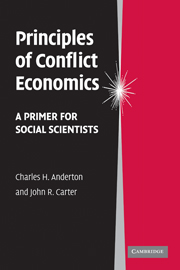Book contents
- Frontmatter
- Contents
- List of Figures
- List of Tables
- Preface
- 1 Introduction: Definition and Scope of Conflict Economics
- 2 Production Possibilities and the Guns versus Butter Trade-Off
- 3 Rational Choice and Equilibrium
- 4 Fundamentals of Game Theory
- 5 A Bargaining Model of Conflict
- 6 Conflict between States
- 7 Civil War and Genocide
- 8 Terrorism
- 9 Geography and Technology of Conflict
- 10 Arms Rivalry, Proliferation, and Arms Control
- 11 Military Alliances
- 12 Conflict Success Functions and the Theory of Appropriation Possibilities
- Appendix A Statistical Methods
- Appendix B A More Formal Bargaining Model of Conflict
- References
- Author Index
- Subject Index
Appendix A - Statistical Methods
Published online by Cambridge University Press: 05 June 2012
- Frontmatter
- Contents
- List of Figures
- List of Tables
- Preface
- 1 Introduction: Definition and Scope of Conflict Economics
- 2 Production Possibilities and the Guns versus Butter Trade-Off
- 3 Rational Choice and Equilibrium
- 4 Fundamentals of Game Theory
- 5 A Bargaining Model of Conflict
- 6 Conflict between States
- 7 Civil War and Genocide
- 8 Terrorism
- 9 Geography and Technology of Conflict
- 10 Arms Rivalry, Proliferation, and Arms Control
- 11 Military Alliances
- 12 Conflict Success Functions and the Theory of Appropriation Possibilities
- Appendix A Statistical Methods
- Appendix B A More Formal Bargaining Model of Conflict
- References
- Author Index
- Subject Index
Summary
Statistical analysis involves populations, samples, luck of the draw, and systematic inferences. This appendix provides an informal and somewhat intuitive introduction to the basic statistical methods used in conflict economics.
Populations and Samples
A population is just a collection of relevant objects. A simple example might be the citizens of a country. Associated with the citizens are variables that measure attributes like income, age, gender, political opinion, and so on. Thus, populations can be thought of as collections of values of various variables of interest. Summary measures of these population values are called parameters. Suppose the variable of interest is income. Then the parameters might include the mean μ and the standard deviation σ of income. The mean is just the arithmetic average of the citizens' incomes. The standard deviation measures dispersion and indicates how far the income values typically lie above or below the mean. Alternatively, suppose the variable of interest is citizens' political opinion. Then a key parameter might be the proportion π of citizens who oppose the current regime.
While the full population is of ultimate interest, researchers usually work with a subset of the population called a sample. To the extent that the sample is representative, it provides useful information about the larger population. Corresponding to population parameters are sample statistics. Just as parameters summarize the values in the population, statistics summarize the values in a sample.
- Type
- Chapter
- Information
- Principles of Conflict EconomicsA Primer for Social Scientists, pp. 269 - 276Publisher: Cambridge University PressPrint publication year: 2009



